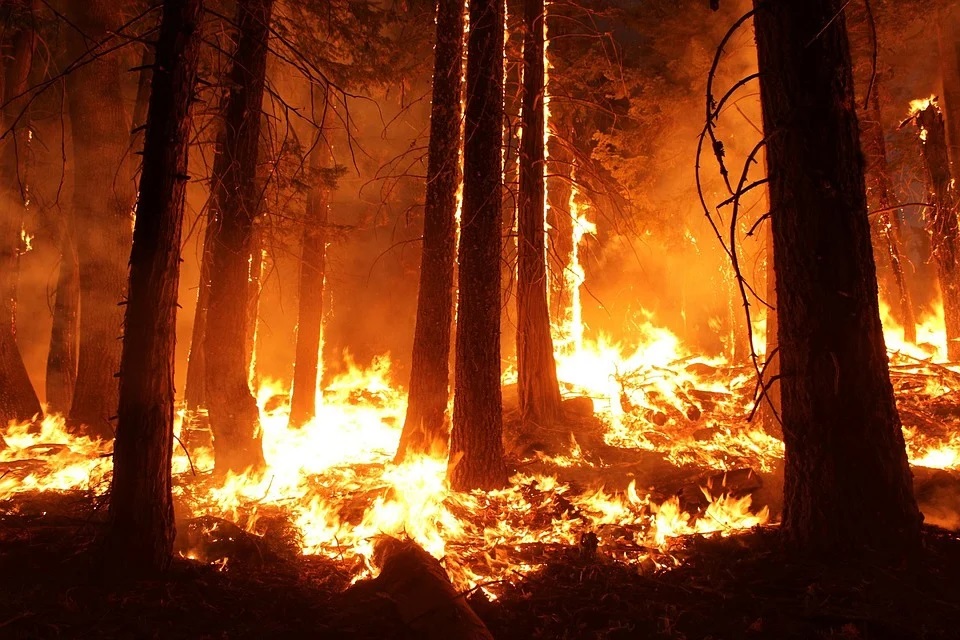
Wildfire Safety Tips That Could Save Your Life
Wildfires can occur for a variety of reasons, but most are caused by human actions, whether directly (ie unattended campfires, fireworks) or indirectly (transformer sparks, powerline arcing, etc). The National Park Service estimates that only about 10% of wildfires are started by natural causes such as lightning.
Regardless of how they are started, they are highly unpredictable and can be deadly. With the severe heat, drought conditions, and wildfires currently burning across much of the western US states, those who are out adventuring need to be aware of wildfire conditions and what can be done to keep you and your family safe in the backcountry.
Know the current wildfire conditions and fire restrictions for the area you are traveling.
Check with the national forest, state, and county as individual governing entities may have different restrictions. Driving routes may be impacted, so check your route for road closures and cautions. Also, keep in mind that fire conditions and restrictions can change often, so check frequently so that you know what is permitted or restricted. Closures and restrictions aren’t put in place to ruin your vacation; they are put in place for safety reasons. Take them seriously.
Choose a campsite that has more than one escape route.
Have more than one way that you can leave the area. You might be tempted to camp way up in that canyon near the end of the road, but if your access is cut off from a fire, you will have no way to leave.
Park for a quick departure.
Back into the spot if you need to so that should you need to leave quickly, you don’t have to worry about jockeying around in the smoke to get out.
Don’t start a wildfire.
This involves knowing what is not allowed and being responsible for your actions. Make sure that you don’t spill flammable liquids and that any cook stoves or lanterns are cold to the touch before storing them. Seemingly innocuous things like smoking outside or mosquito candles may lead to fire danger under the right (or wrong) conditions. If you are permitted to have a campfire, be sure it is completely extinguished before you leave.
The sooner a problem is reported, the faster people can start taking action to get it under control or extinguished.
Don’t discard cigarettes, matches, or smoking materials on the ground.
Drown them in a glass of water, then put them in the trash. No one wants to see that litter anyhow.
If you are asked to evacuate, do so immediately.
If you are boondocking, there is likely not going to be anyone to tell you that a fire is in the area, so be aware of conditions and get yourself out if you see or smell smoke. Do not be tempted to linger for photos. Don’t drive slowly looking at flames.
If everything has gone wrong…
You are in trouble. Don’t try to outrun the fire. If possible, get yourself submerged in a body of water (pond, river) as fast as you can. If there is no water, find a depression (low area) with as little vegetation as possible. Lie low to the ground and cover yourself with wet clothing. Protect your lungs as best as you can and stay down until the fire passes.
If you see wildland firefighters, THANK THEM.
Many of them are volunteers and are doing dangerous work away from their families. Don’t loiter or get in their way, just say thank you and do what they ask you to do.
See also:

Great! The most important article I’ve read in a travel magazine. We live in the Washington Cascades surrounded by forest. I can tell you that every summer when the helicopters start dipping for water in front of our house, I am finding out exactly where the fire is and planning an escape. Firefighters ARE heroes in my book.
Thanks for publishing this for everyone.
You really do not need a campfire when it’s 80 degrees plus out there. Have a little common sense when the forests are tinder dry.
Most wildland firefighters are NOT volunteers; they are federal or state employees — mostly seasonal or temp employees — along with some contract crews. Calling “the park service” is silly advice, when most wildland fires are not on NPS land.
Daily updates are posted by region. http://gacc.nifc.gov
Click on the map and look under “Intelligence” for the morning report or the situation report.
Updated fire news is also posted at http://wildfiretoday.com
There are two critically important rules for RV people that aren’t even mentioned here. One is to DO WHAT YOU’RE TOLD if a firefighter or sheriff’s deputy tells you where to go. Don’t try to be clever and figure out a better route or a way to stay where you are. Read John Maclean’s book THE THIRTYMILE FIRE.
AND — make absolutely certain your towing vehicle and RV are meticulously maintained. Just about every year there’s a rip-roaring wildfire started by an RV going down the road dragging a chain or a metal part, sparking along the roadway igniting fine fuels. Don’t be that guy.